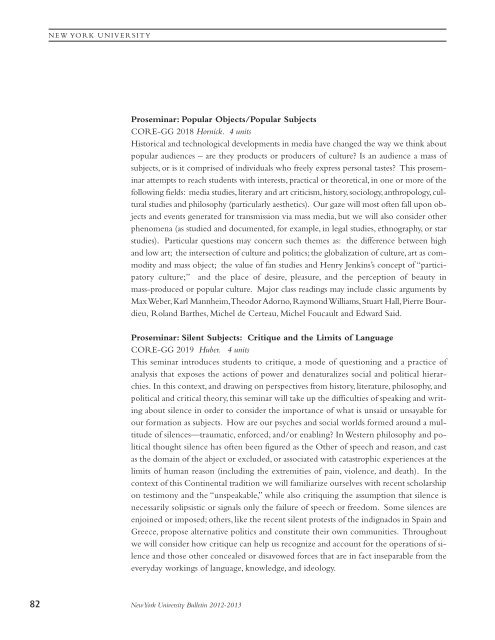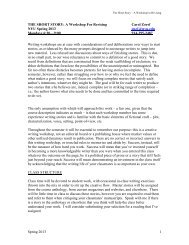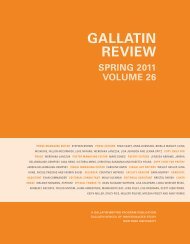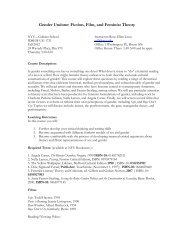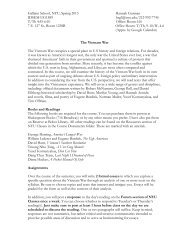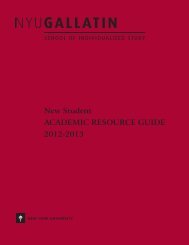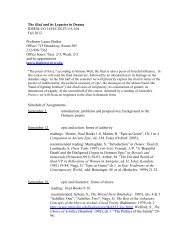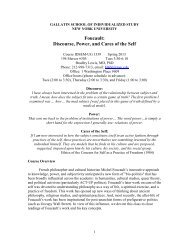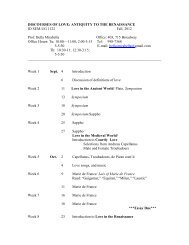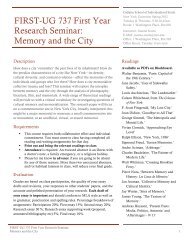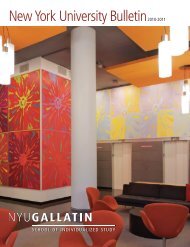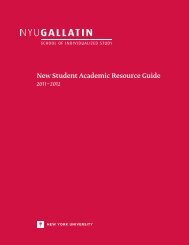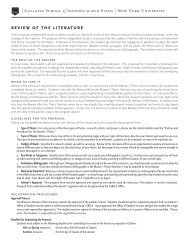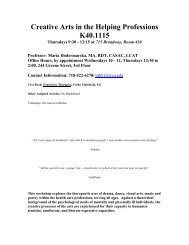New York University Bulletin - Gallatin School of Individualized ...
New York University Bulletin - Gallatin School of Individualized ...
New York University Bulletin - Gallatin School of Individualized ...
You also want an ePaper? Increase the reach of your titles
YUMPU automatically turns print PDFs into web optimized ePapers that Google loves.
NEW YORK UNIVERSITYProseminar: Popular Objects/Popular SubjectsCORE-GG 2018 Hornick. 4 unitsHistorical and technological developments in media have changed the way we think aboutpopular audiences – are they products or producers <strong>of</strong> culture? Is an audience a mass <strong>of</strong>subjects, or is it comprised <strong>of</strong> individuals who freely express personal tastes? This proseminarattempts to reach students with interests, practical or theoretical, in one or more <strong>of</strong> thefollowing fields: media studies, literary and art criticism, history, sociology, anthropology, culturalstudies and philosophy (particularly aesthetics). Our gaze will most <strong>of</strong>ten fall upon objectsand events generated for transmission via mass media, but we will also consider otherphenomena (as studied and documented, for example, in legal studies, ethnography, or starstudies). Particular questions may concern such themes as: the difference between highand low art; the intersection <strong>of</strong> culture and politics; the globalization <strong>of</strong> culture, art as commodityand mass object; the value <strong>of</strong> fan studies and Henry Jenkins’s concept <strong>of</strong> “participatoryculture;” and the place <strong>of</strong> desire, pleasure, and the perception <strong>of</strong> beauty inmass-produced or popular culture. Major class readings may include classic arguments byMaxWeber, Karl Mannheim,Theodor Adorno, RaymondWilliams, Stuart Hall, Pierre Bourdieu,Roland Barthes, Michel de Certeau, Michel Foucault and Edward Said.Proseminar: Silent Subjects: Critique and the Limits <strong>of</strong> LanguageCORE-GG 2019 Huber. 4 unitsThis seminar introduces students to critique, a mode <strong>of</strong> questioning and a practice <strong>of</strong>analysis that exposes the actions <strong>of</strong> power and denaturalizes social and political hierarchies.In this context, and drawing on perspectives from history, literature, philosophy, andpolitical and critical theory, this seminar will take up the difficulties <strong>of</strong> speaking and writingabout silence in order to consider the importance <strong>of</strong> what is unsaid or unsayable forour formation as subjects. How are our psyches and social worlds formed around a multitude<strong>of</strong> silences—traumatic, enforced, and/or enabling? In Western philosophy and politicalthought silence has <strong>of</strong>ten been figured as the Other <strong>of</strong> speech and reason, and castas the domain <strong>of</strong> the abject or excluded, or associated with catastrophic experiences at thelimits <strong>of</strong> human reason (including the extremities <strong>of</strong> pain, violence, and death). In thecontext <strong>of</strong> this Continental tradition we will familiarize ourselves with recent scholarshipon testimony and the “unspeakable,” while also critiquing the assumption that silence isnecessarily solipsistic or signals only the failure <strong>of</strong> speech or freedom. Some silences areenjoined or imposed; others, like the recent silent protests <strong>of</strong> the indignados in Spain andGreece, propose alternative politics and constitute their own communities. Throughoutwe will consider how critique can help us recognize and account for the operations <strong>of</strong> silenceand those other concealed or disavowed forces that are in fact inseparable from theeveryday workings <strong>of</strong> language, knowledge, and ideology.82 <strong>New</strong><strong>York</strong> <strong>University</strong> <strong>Bulletin</strong> 2012-2013


